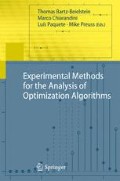Abstract
Theory and experiments are complementary ways to analyze optimization algorithms. Experiments can also live a life of their own and produce learning without need to follow or test a theory. Yet, in order to make conclusions based on experiments trustworthy, reliable, and objective a systematic methodology is needed. In the natural sciences, this methodology relies on the mathematical framework of statistics. This book collects the results of recent research that focused on the application of statistical principles to the specific task of analyzing optimization algorithms.
Access this chapter
Tax calculation will be finalised at checkout
Purchases are for personal use only
Preview
Unable to display preview. Download preview PDF.
References
Ackermann R (1989) The new experimentalism. British Journal for the Philosophy of Science 40:185–190
Bartz-Beielstein T (2006) Experimental Research in Evolutionary Computation— The New Experimentalism. Natural Computing Series, Springer, Berlin, Heidelberg, New York
Bartz-Beielstein T (2008) How experimental algorithmics can benefit from Mayo’s extensions to Neyman-Pearson theory of testing.Synthese 163(3):385–396, DOI 10.1007/s11229-007-9297-z
Birattari M (2005) Tuning Metaheuristics. Springer, Berlin, Heidelberg, New York
Burke EK, Gendreau M, Gendron B, Rousseau LM (eds) (2008) Proceedings of the 7th International Conference on the Practice and Theory of Automated Timetabling, PATAT 2008, Université de Montréal, Montreal, CA, available online: https://symposia.cirrelt.ca/PATAT2008/en/ Proceedings
Chalmers AF (1999) What Is This Thing Called Science. University of Queensland Press, St. Lucia, Australia
Dorigo M, Stützle T (2004) Ant Colony Optimization. MIT Press, Cambridge, MA, USA
Golden B, Raghavan S, Wasil E (eds) (2008) The Vehicle Routing Problem: Latest Advances and New Challenges, Operations Research/Computer Science Interfaces Series, vol 43. Springer
Hacking I (2001) An Introduction to Probability and Inductive Logic. Cambridge University Press, Cambridge, UK
Hooker J (1996) Testing heuristics: We have it all wrong. Journal of Heuristics 1(1):33–42
Johnson DS (2002) A theoretician’s guide to the experimental analysis of algorithms. In: Goldwasser MH, Johnson DS, McGeoch CC (eds) Data Structures, Near Neighbor Searches, and Methodology: Fifth and Sixth DIMACS Implementation Challenges, DIMACS Series in Discrete Mathematics and Theoretical Computer Science, vol 59, American Mathematical Society, pp 215–250
Kirkpatrick S, Gelatt D, Vecchi MP (1983) Optimization by simulated annealing. Science 220(4598):671–680
Mayo DG (1983) An objective theory of statistical testing. Synthese 57:297–340
Mayo DG (1996) Error and the Growth of Experimental Knowledge. The University of Chicago Press, Chicago IL
McGeoch CC (1996) Toward an experimental method for algorithm simulation. INFORMS Journal on Computing 8(1):1–15, (this journal issue contains also com1 mentaries by Pierre L’Ecuyer, James B. Orlin and Douglas R. Shier, and a rejoinder by C. McGeoch)
Motwani R, Raghavan P (1995) Randomized Algorithms. Cambridge University Press, Cambridge, UK
Schwefel HP (1995) Evolution and Optimum Seeking. Sixth-Generation Computer Technology, Wiley, New York NY
Van Hentenryck P, Michel L (2005) Constraint-Based Local Search. The MIT Press, Cambridge, USA
Author information
Authors and Affiliations
Corresponding authors
Editor information
Editors and Affiliations
Rights and permissions
Copyright information
© 2010 Springer-Verlag Berlin Heidelberg
About this chapter
Cite this chapter
Bartz-Beielstein, T., Chiarandini, M., Paquete, L., Preuss, M. (2010). Introduction. In: Bartz-Beielstein, T., Chiarandini, M., Paquete, L., Preuss, M. (eds) Experimental Methods for the Analysis of Optimization Algorithms. Springer, Berlin, Heidelberg. https://doi.org/10.1007/978-3-642-02538-9_1
Download citation
DOI: https://doi.org/10.1007/978-3-642-02538-9_1
Published:
Publisher Name: Springer, Berlin, Heidelberg
Print ISBN: 978-3-642-02537-2
Online ISBN: 978-3-642-02538-9
eBook Packages: Computer ScienceComputer Science (R0)

